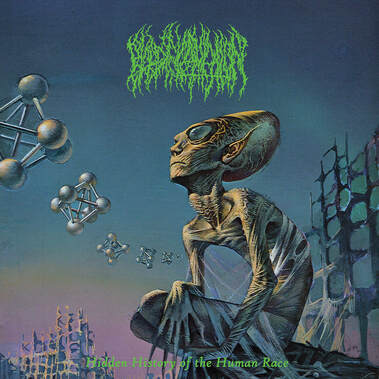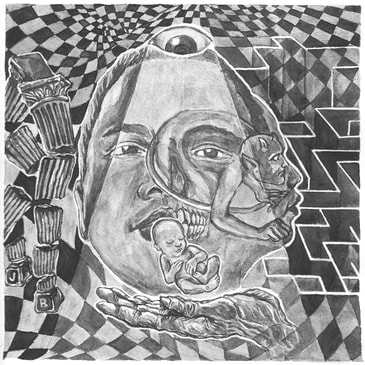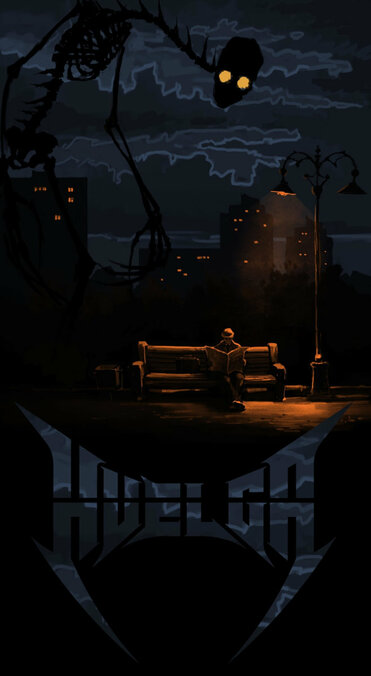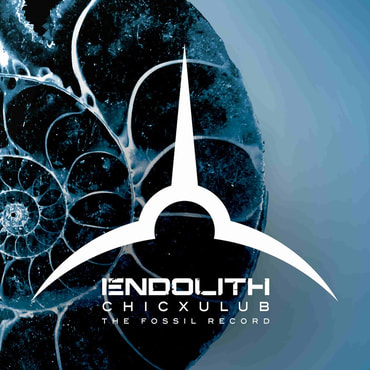 Well, here we are. The belly of the riff-lovin' extraterrestrial beast. You'll inevitably be subjected to a veritable cosmic load of Blood Incantation hype in the weeks to come prior to Hidden History of the Human Race's November 22nd release, so I'll keep this intro brief. Blood Incantation's meteoric rise to the upper echelon of underground death metal carried with it a burden of expectation. 2016's Starspawn hit the scene with an expansive roar, solidifying Blood Incantation's reputation as an outfit willing to inject a little intensity and exploration into their forward-thinking approach to atmospheric death metal. How do you follow up a flawed-but-remarkably-promising debut? In an ideal world, by removing said flaws from the picture, while simultaneously pushing onward and upward so as to avoid stagnation. No small order. To assess Blood Incantation's latest offering, two Village-dwellers took up the pen, making for a rare double review 'round these parts (and quite possibly a triple, if I can get my doddering ass into gear). Without further ado, I'll let them do the talking.
0 Comments
 Yogyakarta, Indonesia is a long way from the humble halls of the Sleeping Village, but, much like the plague that riddles our haggard inhabitants, proggy melodeath knows no borders. In that spirit, we’re breaking out the latest single from Yogyakarta’s own Goddess of Fate. “The Orchard Gardener” represents a tidy breakdown of composition: in the band’s words, “this single is 50% progressive metal and 50% ‘everything else.’” And I’ll be damned, that somehow isn’t mere hyperbole. While the blend may not appear entirely seamless, Goddess of Fate rip it up with a meaty conglomerate of blastbeats, melodeath riffing, tech shredding, acoustic-backed chanting, harsh screams, and (prerequisite) proggy passages. A distinctly jig-esque riff forms the bookends, lending the 7-and-a-half-minutes an epic quality that stretches across the entirety.  Here’s something I’m comfortable admitting: at first blush, Huelga’s self-titled debut EP made for an exceedingly frustrating experience. Inconsistent. Illusive. Nonsensical. Not, in other words, the terms one might enjoy having applied to their passion project of more than a decade. However, after continued exposure and a certain degree of reflection, it became apparent that Huelga is a remarkable effort with a patently unique perspective. Multi-instrumentalist Michael Fonseca--who brings a background in jazz and an apparent interest in the non-conformist and modernist compositions of Zappa and Ives--isn’t here to recycle wrought notions of genre expectation. Huelga, in other words, operates exclusively outside the bubble of comfortable expectation, and for that reason alone, it’s worth our collective whiles. Despite appearing to wear the heavy sonic trappings of groove, thrash and (ill-defined) mathcore, Fonseca's approach aligns the project with avant-garde jazz. Thus, from an instrumental perspective, there’s a mind-boggling amount to discuss--especially given Huelga’s 15 minute run-time. Making ample use of squealing leads, melodic dissonance, poly-rhythms, and aggressively fluid tempos, Huelga offers few moments for the listener to sink in and grasp what is actually happening. Riffs meld and adapt with startling frequency, disappearing into the fold one moment, only to reemerge in some vastly redefined form further down the road, shaped by the rolling boil of seemingly spontaneous invention. Even if this isn’t free-form composition in the true sense of the term, the semblance of improvisation is enough to evoke those noise and jazz connections. Intro track “The Very Marrow of Our Bones” is an effective crash course in Fonseca's methodology--in under 3 minutes, one careens through a deluge of colorful melody, downtuned groove, and an oddly harmonious percussive elements. At times "Marrow" feels djent-y in its distorted technical intensity, but churning thrash elements and pull-out-the-carpet percussion prevent anything approaching stagnation. “Chinga de Perro” and the 2-part “No Word for Blue” continue this pattern, although the latter--the album highlight, in my humble opinion--does feel slightly more consistent, due to its use of identifiable melodies across the first half. Huelga is not clever because its complicated. Rather, it is clever because it demonstrates a complex understanding of modern arrangement, and utilizes the tools it has avaliable to effectively illustrate a central contextual background. Inspired by the Chicano Movement and the obvious stress and violent intentions that arise from a border defined, in many way, by borderline xenophobia, Foncesa is decidedly mission-based. To quote his bio, Huelga “takes a stand against the anti-Latinx, anti-immigrant sentiment that pollutes ‘The Land of the Free’ today.” To this end, the arrangements herein do an inordinately good job at creating--and reflecting--a palpable sense of tension. This particular scribe is a firm believer that art is, inherently speaking, a product of its political environment. In the case of Huelga, this environment feels essential to both the musical impact and approach. How best to summarize a project that so willingly denies categorization? In short, the musical virtuosity on display is undeniable. That said, intriguing and ear-catching instrumentation does not (necessarily) a good song make, and the absence of traditional structure can make for a jarring listening experience if you’re approaching Huelga on a casual level. But yet, these moments of melodic dissonance, of tempo-shifting blindsides, and of seemingly blatant inconsistency are what define Huelga’s unique sonic assault. As such, Huelga highlights a truth that we often miss: there is undeniable beauty in the unexpected. Take, for example, the bright chime that claims a brief moment in the spotlight on “Chinga de Perro.” Seemingly uncalculated, it adds an unexpected flair to the full picture, a moment of interest in a sea of interesting moments. Like so many across this debut, this glimmer exudes gleeful revelry in its rejection of expectations. Lack of continuity gives the affair, for obvious reasons, a disconnected and ungrounded aura--a “floating world” feeling where technical aspects astound, but the (seeming) lack of foundation offers a challenge to the audience. In the context of a more prototypical work, this would undoubtedly come across as criticism. Not so here. Fonseca is seeking, it would seem, to disassemble our understanding of the ways in which heavy music can operate. After several encounters, I’ve come to realize that he succeeds incredibly. Huelga’s self-titled debut will be released April 5th, 2019.  Written by: Loveloth and the Soliloquist Chicxulub - The Fossil Record is the second full-length album by Norwegian progressive extreme metal band Endolith. In contrast to their debut album that dealt with rather cold, esoteric themes, Chicxulub is a concept album on, as the band calls it, more “tangible” themes: dinosaurs, fossils, and the Chicxulub crater buried under the Yucatán Peninsula in Mexico where an asteroid or comet hit and set off the extinction of the dinosaurs. Whether you want to call these topics “tangible” or not - they are definitely interesting and pretty unique. More on that later. Musically speaking, Chicxulub is a brutal and progressive death metal album with lots of interesting stylistic elements that result in a very unique sound. Featuring the strings of the Arctic Philharmonic Chamber Orchestra, and guest musicians on timpani and solo viola including world famous violinist Henning Kraggerud, the album has a very grand and epic dimension to it, which contrasts and complements the ferocious death metal basis of its sound. When we at the Sleeping Village got the promo for this album, two of our writers were very interested in reviewing it - Loveloth and the Soliloquist. And since we could not decide who should write it, we had an idea: Why not write a review together? So, here it is: The first edition of TwofoldTreatise - two critics, one album. Soliloquist: Okay, let’s start this review by talking about the dinosaur in the room. This is an album about the extinction of the dinosaurs. Pretty metal, if you ask me. I find it rather interesting that I have never heard a metal album about dinosaurs before, actually. Loveloth: Ever since I was a wee lad, dinosaurs fascinated me. So much in fact, I wanted to be a palaeontologist but life panned out differently. In any case this should be right up my alley. Prog hybrid record about dinosaurs? Yes please, I’ll have one of those to get my mezosoic fix before The Ocean release Phanerozoic II. Soliloquist: Dude, this sounds exactly like my biography. I also wanted to be a paleontologist and my childhood was reigned by dinosaurs. I still know most of their names and have a rather great amount of completely useless knowledge about them. Dinosaurs are freaking cool, man. So, what were some of your initial impressions when listening to this album? Loveloth: Same here my dude, Walking with… series were a constant companion back in my youth so now I understand why both of us were so interested in this. Glad you asked, I liked the record and I am ready to discuss. Before we start that, a question. What bands do Endolith remind you of? Soliloquist: That’s a very good question. I got strong Devin Townsend vibes throughout the album. The wall-of-sound approach to songwriting the band uses frequently on this record is very akin of Devin’s approach in my opinion. Some of the proggier death metal sections made me think of Rivers of Nihil’s latest album and lots of the rest, e. g. the clean vocal choruses, as well as some of the riffs, reminded me of Extol, another Norwegian prog-death band. How about you? Loveloth: Interesting, I’m a huge Devy fanboy and didn’t hear a lot of his influence here, apart from the production like you mentioned. For me though, Endolith remind me of an angrier, shriekier The Ocean mixed with Meshuggah (some of those riffs man), Extol (good call btw) and Dimmu Borgir and Septicflesh due to The Arctic Philharmonic Chamber Orchestra lending a hand, or thirty eight to be more exact. Judging by our descriptions (and please do judge, we’re totally in the right), this is a weird band, so what stood out for you the most? Soliloquist: First of all, I agree 100% on the Meshuggah part. Totally forgot to mention them, they came to my mind, as well. Yes, weird is a good word to describe them. I can’t even pinpoint one particular thing that stood out to me. The lyrics, the atmosphere, the combination of orchestral elements, death metal and those melodic sections - there’s so much interesting stuff going on in this album. I think the first thing that really struck me when I listened to it for the first time was how prominent the orchestral elements are in the band’s sound and how well they fit in with the djenty extreme metal riffs. The clean vocals were another element that really pleasantly surprised me. Loveloth: It’s quite a dense package, that’s for sure but Endolith make it work, not only that but constantly throw curveballs at the listener for good measure. The addition of the orchestra was an excellent call as it adds another layer of atmosphere and since we’re dealing with that pesky asteroid which wiped out the dinosaurs, that grand scope which the strings, brass, percussion and woodwinds provide comes in really handy. I’ll be honest and state how I wasn’t particularly impressed with Chicxulub after my first listen but it grew on me as I started wrapping my head around all the mayhem that is present here. Take “Nest Scrape Display” for example, and how its thrashy beat clashes with a very Shuggah riff but as soon as you get used to it, we get a soaring chorus that greatly reminds me of their fellow countrymen In Vain. Endolith are unhinged, ambitious and I like that but I feel the band is yet to achieve their peak. Some things just feel off. Do we share this sentiment? Soliloquist: Absolutely. My listening experience with this album was interestingly the other way around. Listening to it for the first time was super impressive, but after multiple listens I began to notice some flaws and things I didn’t like all that much. I think this is a great album by a band with lots of potential to become even better in the future. Endolith have a rather unique sound already and I think they’ll be refining it on future releases. I’ll definitely keep an eye on them. Do you have a favourite song on the record or one that stands out to you in any way? Loveloth: I do actually and guess what, it’s the proggiest and longest track, I am of course referring to the title track. It contained the only “oh shit” moments on the record. That breakdown around the three minute mark is nasty but what completely caught me off guard is the return of the record’s main theme that appears in the beginning of “Bloodfiends”. It’s a good and effective trick that works wonders with prog bois such as me. After it, the track morphs into a lengthy and epic outro and this is where Endolith shines the most as they have the time to successfully pull-off every idea they have for the song. And while no song is bad, some are a bit underwhelming like “Mount Evidence” or the final, bluesy track “When The Earth Died Screaming”. The idea is extremely cool but the execution lacks something I can’t quite put my finger on. What’s your favourite? Soliloquist: I’m not quite sure. The title track is great and I really like “Nest Scrape Display” and “Ichthys” a lot, but I think I have to go with “Diseasons”. I love how ominous and atmospheric it begins and how ridiculously heavy it gets towards the end. The harmonies and melodies on this track are some of the best on the album and it generally feels the most “complete” and thought out to me. Loveloth: “Diseasons” almost ended up as my favourite for reasons you mentioned and I totally agree on it feeling the most “complete”. Regardless of this positives we went through, I still think I should like this more than I do. It has everything I like: paleontology, prog, djent, unconventional songwriting, dynamic vocals, experimentation, an orchestra and fat riffs but I still feel something is stopping the band from creating a true gem and I am yet to pinpoint what and maybe that’s the problem! It’s so hard to define this record and I think that hinders it despite helping it. I know that sounds contradictory but hear me out. Endolith needs to find that is completely theirs to solidify their character and that comes with time, time the band has because despite this flaw, Chicxulub is an enjoyable, quirky and fun journey that I see myself revisiting from time to time. Soliloquist: I agree on almost everything you mentioned. I enjoyed Chicxulub enough to listen to it many times and never be bored or annoyed by it, but it also didn’t blow me away or become an album I’d call an absolute masterpiece. I see it primarily as an album by a band still figuring out their definitive style and within that framework it’s a very good album. It has its flaws and some edges that would have needed some smoothening, but it’s definitely a lot of fun to listen to and I don’t regret a minute I spent with it. Loveloth: Absolutely, well, think we went through everything, surprised how much we agree on things, must be the palaeontology fixation, in any case, if you are in some need of odd, eccentric and progressive death metal, Chicxulub (unlike the poor dinos) is here and available on every music platform, you know how it goes. Any last words Mr. Soliloquist? Soliloquist: Life uh.... finds a way. Loveloth: Thus spake the Soliloquist and Loveloth, the two lords of palaentology-laden metal. Endolith - Chicxulub - The Fossil Record was released Jan. 18th from Rob Mules Records
Endolith can be found: Official website |
Welcome!
We provide thoughtful reviews of music that is heavy, gloomy...and loud enough to wake us from slumber. Written by a highfalutin peasantry!
|


 RSS Feed
RSS Feed